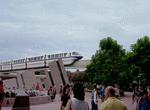Disney World, Florida
![]()
Monorail "Purple" seen in 2004. Photo by Chris Slaight.
Overview
The Disney World Monorail opened in 1971, serving the Magic Kingdom and the Transportation and Ticket Center (TTC), the location of the parking lot for the Magic Kingdom. In 1982 it was extended from the TTC to serve the EPCOT Center park. There are three routes, the first runs in a counterclockwise direction on the outer track, making no other stops other than the TTC and Magic Kingdom; the second runs clockwise on the inner track stopping at the TTC, Polynesian Resort, Grand Floridian Resort, Magic Kingdom, and Contemporary Resort. The third route runs from the TTC to EPCOT. In addition to one beam for each of the routes, there is a connection between the TTC-EPCOT beam and the TTC-Magic Kingdom beam near the TTC and a siding that runs along the edge of the Magic Kingdom near Tomorrowland, leading to the "shops and yard" for the monorail.
By special request it is possible to ride in the cab with the operator, and to tour the entire system takes about 60-90 minutes, depending on how patient you are for cab rides. If you want to ensure you get a cab ride (highly recommended), tell one of the attendants at each boarding station you want one and they will tell you where to wait. Keep in mind due to the popularity of cab rides (yes, non-railfans like them too), you most likely won't be able to do full loops in the cab, since there is a maximum capacity of four people in the cab (not including the operator).
The beams for each of the routes are easily recognizable. They are concrete and look similar to the concrete used on recent elevated transit construction such as on portions of the Washington MetroRail. From the ground, it looks like there are two rails. But, upon careful inspection, you will realize that one of the rails is the "third rail", providing power for the train. The other is the one actually guiding the train. The top of the beam itself is flat and has nothing on it other than the markers (described later). The train merely rides above the top of the beam.
There are a total of 12 trains for the monorail. The exteriors are painted white with a colored stripe around the whole body below the windows. It is this stripe that identifies the train for communication purposes. The colors of the stripes are blue, red, black, gold, silver, pink, coral, orange, green, lime, purple, and yellow. Each train is 6 cars. The cars are permanently coupled with articulated joints between each. There is a full width cab in the end cars. The interior of all the cars is the same. There are two rows with 5 seats each at each end, as well as two rows of 5 seats in the middle of the car. You cannot pass between the two halves of each car. There are two doors on each side of each car that open outwards, then slide apart, like the front doors of an RTS bus. There are also poles for standees.
The trains, contrary to popular belief, are not automatically driven nor do they have the capability to run automatically, despite there being systems capable of using Zero Person Train Operation as early as the 1960s. There is a single lever controller with five points for accelerating and five points for braking. The first point will bring the train to 15 MPH, the second to 20, and so on until the fifth and final, which will have the train reach its maximum speed of 40 MPH. Each train is equipped with the "MAPO" system, their form of cab signaling. Unlike on the Washington MetroRail, where the operator is given a speed readout, MAPO merely illuminates one of three lights, green, yellow, or red. A green light means the train in front is far enough ahead to operate at the maximum speed for that section of track. A yellow light means that the train is too close to the one in front and needs to stop by the next "marker", a set of four reflectors on the top of the beam. If the train does not stop it is automatically stopped after passing the next marker. The door controls are located on a vertical panel on the exterior of the train on each side next to the door to the cab.
Route Map

Photo Gallery
| Five Random Images | ||||
 Image 36854 (56k, 745x525) Photo by: Oren H. |  Image 36865 (121k, 720x545) Photo by: Chris Slaight |  Image 36869 (132k, 720x545) Photo by: Chris Slaight |  Image 36877 (74k, 820x553) Photo by: Paul Polischuk |  Image 104151 (326k, 1044x817) Photo by: Bob Pickering |
Page Credits
Text by Oren H. Map by SPUI at wikimedia commons.